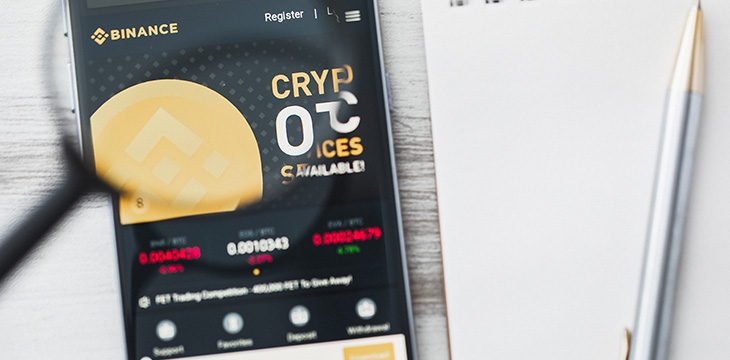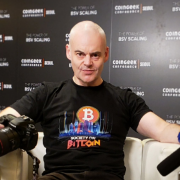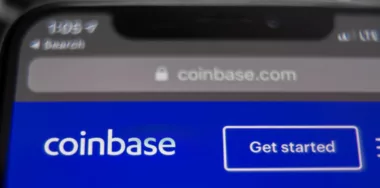Looks like Binance’s bad August could be getting worse. Hot on the heels of the sudden and mysterious resignation of new Binance.US CEO Brian Brooks comes more speculation the exchange may be under the U.S. Securities and Exchange Commission (SEC) investigation.
As well as additions to the list of banks blocking payments to the exchange and government officials making warnings (which have become almost routine by now), Binance has faced more accusations that it is lax with security procedures and has engaged in market manipulation.
SEC looking into Binance’s activities?
The latest news comes via a Freedom of Information request to the U.S. SEC from “Aaron Greenspan,” who asked the regulator if it could either confirm or deny the cryptocurrency exchange was the subject of an official investigation:
SEC has now confirmed that #Binance is under investigation by the Federal Government
For months, Binance CEO Changpeng Zhao has denied the rumors, and said it was all “FUD” pic.twitter.com/zMTs5RVcLI
— WhaleWire (@WhaleWire) August 23, 2021
Despite the description in the tweet above, the SEC did not officially confirm or deny an investigation. However, it did begin its explanation by saying:
“We are withholding records that may be responsive to your request under 5 U.S.C. section 552(b)(7)(A). This exemption protects from disclosure records compiled for law enforcement purposes, the release of which could reasonably be expected to interfere with enforcement activities.”
This would suggest that such records do actually exist. Whether the SEC has launched an official investigation or not, it appears someone at the SEC has been looking into Binance’s activities. The regulator stressed that this “should not be construed as an indication by the Commission or its staff that any violations of law have occurred.”
Binance supporters claimed the letter represented yet more “FUD” (a term Binance is forced to use often) and that the SEC would naturally be looking into the activities of all digital asset exchanges. The latter part is probably true, but as one of the world’s busiest exchanges and one frequently accused of various misdeeds, any kind of close examination could discover something the company would prefer to keep to itself.
It doesn’t help that Binance’s highest-profile attempt at a regulatory-friendly image resigned this month just a few months after joining. Former Acting Comptroller of the U.S. Office of the Comptroller of the Currency (OCC) Brian Brooks was appointed CEO of Binance.US in late April 2021.
It’s rare for a CEO’s tenure to be summarized in just two tweets, but here you go:
"Now that we're in a $2 trillion market cap in #crypto, I think the fear that regulation will somehow vanish or suppress this, that's gone away.”@BrianBrooksUS Incoming CEO @BinanceUS on crypto decentralization, $COIN, and putting focus on money laundering & terrorism finance. pic.twitter.com/jmYSeXjVmm
— Julia Chatterley (@jchatterleyCNN) April 21, 2021
Greetings #crypto community. Letting you all know that I have resigned as CEO of @BinanceUS . Despite differences over strategic direction, I wish my former colleagues much success. Exciting new things to come!
— Brian Brooks (@BrianBrooksUS) August 6, 2021
If hiring a high-level former federal government regulator was supposed to be a fresh look for Binance, having him resign after a few months and state publicly it was for “differences over strategic direction” is a very bad one instead.
Brooks has not provided any more details on what the differences or strategic direction were. However, his experience and reputation as a regulator have only prompted more speculation that Binance could be headed for more trouble.
From its beginnings in mid-2017, Binance has strategically maintained a “decentralized” organizational structure. Though each of its local-national operations shares its name and logo, they are promoted as “independent” businesses that each comply with local regulations. It has long been ambiguous which entity is its de facto (as opposed to official) “headquarters” or controls what or directs overall corporate policy.
Internal company documents reportedly leaked in the past suggested this was deliberate, with Binance.US acting as a friendly face for the globally powerful U.S. government.
None of this has deterred Binance from appointing more former regulators to its other subsidiaries. This week, it announced its Singapore-registered entity Binance Singapore had hired Richard Teng as its new CEO. Teng is the former CEO of Financial Services Regulatory Authority at Abu Dhabi Global Market (ADGM).
Throughout all this, Binance has consistently maintained a public position that compliance is a serious issue at the company. Saying and doing, of course, are different things: traders in the Bitcoin BSV community noticed one statement in particular this week:
Upon learning about allegations of market manipulation made against us, we want to make our position regarding this critical subject matter clear.
Binance has never traded against our users nor manipulated the market, and we never will.
— Binance (@binance) August 23, 2021
“Binance has never manipulated the market” but its April 2019 delisting of BSV from its exchange was a blatant act of market manipulation. BSV at the time was a Top 10 digital asset by total market cap—and now the world’s largest public blockchain by all major utility metrics such as data storage and daily transaction volume, scaling ability and average block size with a fast growing application development community. The exchange’s vague statement that the delisting was due to its desire for assets “to meet the high level of standard we expect” rang hollow then, and rings even hollower two years later.
Denials of wrongdoing and public reiterations of integrity are regularly taken with a grain of salt in the blockchain industry, with actual events proving them untrue time and time again. Users are instead forced to read between the lines and decide for themselves if the companies they patronize are trustworthy.
Follow CoinGeek’s Crypto Crime Cartel series, which delves into the stream of groups—a from BitMEX to Binance, Bitcoin.com, Blockstream, ShapeShift, Coinbase, Ripple and Ethereum—who have co-opted the digital asset revolution and turned the industry into a minefield for naïve (and even experienced) players in the market.
New to blockchain? Check out CoinGeek’s Blockchain for Beginners section, the ultimate resource guide to learn more about blockchain technology.








